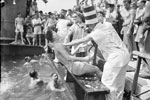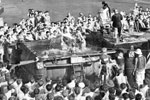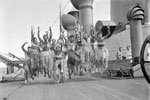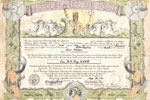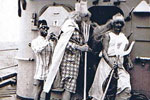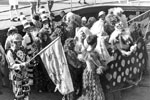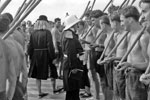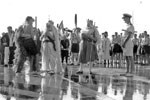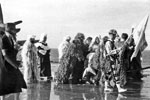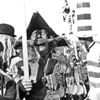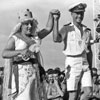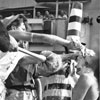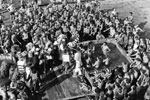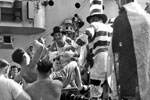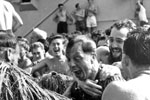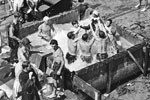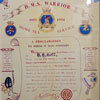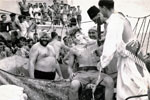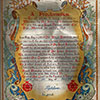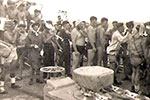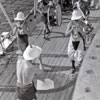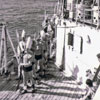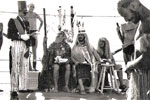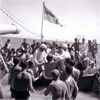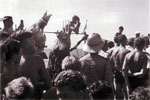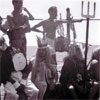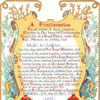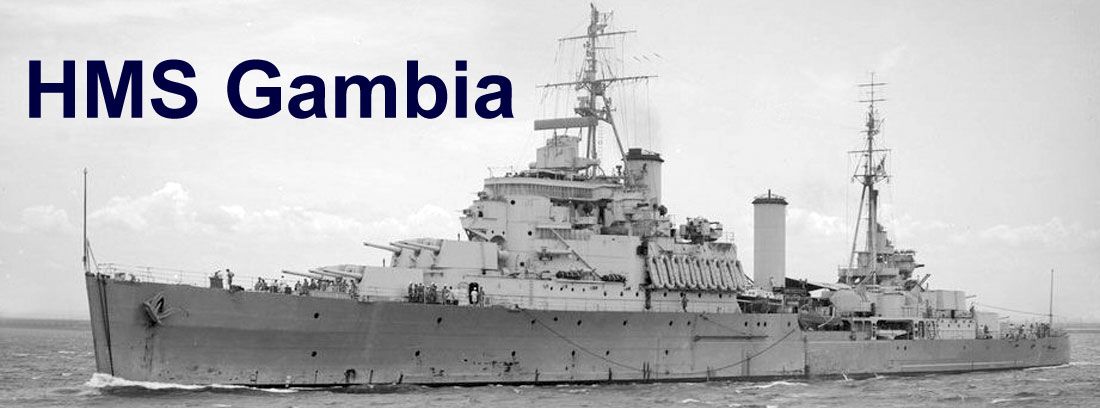
Equator - Crossing the Line
The "Crossing the Line" ceremony appears to be centuries old and some were very rough, even cruel, on the participants. Early Crossing the Lines had a fairly serious purpose, however: they were to test the novices in the crew to see whether they could endure their first cruise at sea. Ceremonies in the seventeenth century were particularly rough and it was not unknown, even until recently, that some participants required medical attention afterwards. The cremoney can be seen as a rite of passage, or bonding ritual between crew members.
Traditionally, the night before crossing the equator, King Neptune sends a messenger, sometimes Davy Jones, informing the Captain that he intends to board the ship the following day, and summons a list of the uninitiated to appear before him. The actual ceremony involves "preparing" these uniniated for their audience before King Neptune. This "preparation" involves a number of activities. These may include crawling through garbage, eating colored food, allowing the Royal Doctor to administer to them, and kissing the Royal Baby (the fattest chief on board) on the belly. Other activities involve the Royal Navigator, Royal Scribe, Dentist, Policemen, Chaplain, Judges, Bears, and Attorneys and continue throughout the day. The penultimate ritual is a "shaving" by the Royal Barber with a huge wooden "razor," after which one is dunked in a tub of water (often dyed a hideous color) to "cleanse" them for the final meeting with King Neptune.
The initiates then appear before King Neptune with his entire retinue which includes Queen Amphitrite, their son Triton, and Davy Jones who proclaims them to be trustworthy fellow sailors. The day ends with each of the newly initiated receiving elaborate certificates testifying to their safe passage.
Davy Jones is traditionaly impersonated by the smallest sailor on board, given a hump, horns and a tail, and his features made as ugly as possible. He is swinish, dressed in rags and seaweed, and shambles along in the wake of the sea king, Neptune, playing evil tricks upon his fellow sailors.
During her 1955/56 commission, HMS Gambia crossed the line on July 22, 1955. Ken Lobb wrote to his wife:
We've been having fun and games today since 9 o'clock this morning. We crossed the equator again today, and had our official 'crossing the line' ceremony, a much more elaborate affair than the one we had about six weeks ago. Even the Daily Orders were written in a comical way, with the heading 'Special Equatorial Routine', and at nine this morning the order came over the speakers, "hands to Dance and Skylark." The Marine Band and guard was paraded, only the Major was dressed as a Sergeant, and the Lieutenant as a Corporal and were part of the guard, the officer of the guard being a Corporal.
Neptune (a little tiny fellow) and his wife, (an enormous fat chap) arrived with their guard and band, and what a funny lot they were. There were comical speeches from them and the Admiral, and medals were presented, and finally they all adjourned to the forecastle for the initiations, which started with the officers, midshipmen, CPO's and PO's and so on down to the boys. Do you remember seeing it at Anthorn last year? Well, I decided to go to it early while the canvas water tank was still clean, and before they got too rough, and having changed into bathing trunks and plimsolls I let the bears take me during the first five minutes, and was duly lifted into the chair, lathered with a sticky mixture of flour and water, prodded by the "Doctor", shaved by the "Barber" and then tipped backwards into the bath to be fiercely ducked by the bears. All jolly good fun, quite harmless, and of course the lads really enjoyed it.
Some superior officers decided they weren't going to play, and one who retired to the Wardroom to read a newspaper was found by the "Policemen" and dragged away, and shaved and ducked complete in his uniform, as was a young midshipman who was taken from the bridge even though he was on watch! All good clean fun for the kiddies, and it went on 'till 12 o'clock, after which a "Make do and Mend" was awarded, which means I've had my camp bed up on the quarterdeck all the afternoon. Incidentally, it took me some time to get clean after this morning's effort because the flour and water all formed a paste which eventually had to be combed out of my hair and off my hairy chest! What a to-do!
This descption comes from "Thirty-Six Years of a Seafaring Life" written by "an Old Quartermaster" (John Béchervaise), published in 1839, it describes the events of June 1825 on HMS Blossom:
There were on board the ship a great number of officers and seamen, who had never yet gone South of the Tropics, consequently were to be initiated into the mysteries of crossing the Equinoctial line, and entering the dominions of Neptune; great preparations had been making since our leaving Woolwich, for an event which promised to some part of the crew great amusement, to the other great fear; many a poor girl at Woolwich, and at Spithead had been deprived of some part of her wardrobe, to adorn Amphitrite; from one a night cap and gown had been stolen, from another some other part of dress, and although I had no hand in it, I was as bad as the rest, for I was consenting thereto. An immense grey horse hair wig, sufficiently long to reach well down the back of Neptune, had been purchased in England by subscription, accompanied by a venerable grey beard to sweep his aged breast; a tin crown and a trident completed the regalia.
On a review of all those who previously had crossed the line, I was selected as Neptune; in vain I endeavoured to defend myself from being deified, it was useless, I must be Neptune, all remonstrance was vain; I took it, resolved to use the trident with mildness. Now reader fancy to yourself the writer of these lines with his legs and arms well blacked, his cheeks, vermillion, short and very loose trowsers, a double frilled shirt, from whose ample folds the salt water dripped plentifully, two swabs for epaulets, a long grey horse hair wig, a venerable beard of the same colour, a tin crown, a trident, and to complete the whole, a hoarse church yard cough; fancy all this I say, and Neptune, or your humble servant in his shape stands before you.
The evening before we expected to cross the line, the lookout man reported at 8 P.M., a light a head; presently a hoarse voice hailed "ship ahoy" which being answered by the Captain, Neptune intimated his intention to visit the ship early next morning. Accordingly early in the morning the ship was made snug, the top-sails were close reefed, courses hauled up, top gallant sails furled, a new sail was secured to the gunwale of the barge on the booms, the other edge to the hammock netting, leaving a hollow of eight feet, capable of containing an immense quantity of water; into this sail the very men who were to be dipped in it, were employed in pumping and bailing water, little thinking, poor creatures, they were making a rod for themselves.
A gun had been dismounted on the forecastle, the carriage made into a car, on which were to sit Neptune and Amphitrite, and between them the Triton; in order to keep all secret, a sail was run across the forecastle to screen Neptune and his gang from observation. Just before the appointed time, all who were likely to undergo the dreadful operation of shaving were ordered below, the gratings put on, and a constable stationed to prevent the ascent of more than one at a time; a wise regulation, for our numbers were nearly equal, and had they shown fight, might have conquered; a rope was rove through a block on the main yard arm, to one end of which was secured a handspike, astride of which sat a man with his hands fastened to the rope over his head.
At 10 A.M. the screen across the forecastle was withdrawn, and exposed to full view, Neptune and his followers. The Purser who had never before crossed the Equinoctial, and who beside was rather inclined to be miserly, applied to the Captain for his orders against shaving; hush! Mr. M- said the Captain, Neptune commands to day, and should I interfere, might ask me some questions, I should find it difficult to answer.
A few minutes after four bells, the car was on the quarter deck; the officers forming a half circle, in the front of which stood the car. When the venerable old Nep, apparently worn down with age and care, rose from his seat, and thus addressed the officers, frequently turning to the Purser.
Why should old Nep the tropic past omit,
Or seamen's custom of observing it?
Where trav'llers when first arrived advance
To pay their freedom, sugar, rum, or mantz;
But if pale poverty the wight surround,
Or surely he refuse his quart or pound,
With little from his slender plea we'll try,
He must be moistened if his jury's dry;
Straight on yon well poised pole is culprit swung,
His arms embrace the rope by which he's slung,
Aloft I cry, and lo aloft he's soared,
The highest mortal we survey on board;
But let his future fate inform you all,
The highest have the greatest height to fall,
Again I cry, and downwards swift he slides,
Cuts the thin air and wond'ring floods divides;
Again aloft he does not long remain,
Alas, he rises but to fall again;
Thrice the blythe crew, the diving miser see,
And the third plunge completely sets him free;
Joyous I'll quit you then with this remark,
I'd treat ten Neps e'er I'd invite a shark.A very appropriate address indeed Father Neptune, observed the Captain, "will you take a glass of wine?" As it was offered so it was accepted; I drank a good health to the tars of Great Britain. Another glass was handed to Amphitrite, who, mother like, offered some to the triton by holding the glass to his lips, taking at the same time special care that not one drop should go inside his mouth; the Purser seeing that he was likely to meet with no support, and dreading the yard-arm and No. 1 razor, turned to me and said "well Father Neptune what is it to be?" "Oh just what you please sir, only remember that the rules of Neptune are like the laws of the Medes and Persians, they alter not." "Well then," said the Purser, "I will give you two bottles of rum, and some porter for yourself;" but I could see it gave the poor Pursera terrible twitch to be forced to so much generosity: the business with the officers was very soon ended, as they were liberal; we gained nothing in the end by it.
The first of the ship's company that were shaved, who was brought up blindfolded by the whole posse of constables was the armourer, a weather-beaten honest old Hibernian, who had been a farrier in the Peninsular Army for many years. At the reduction, he had found his way as armourer of some small craft, and thence to our ship; on his entering for our ship, so anxious was he to be within the given age, which was thirty, that on being asked his age he gave it as eight and twenty, although fifty-six was written in legible characters on his old cribbage face, which through-out the ship's company had gained him the cognomen of old eight and twenty. On this man then the barber had to perform his first functions; a bucket was filled with all the cleanings of the hen coops, pig-stys, &c. and with it a due proportion of tar had been mixed; with a large paint brush dipped in this villanous compound, and his razor, close to him the barber stood waiting the signal.
My first question was "what is your name my man?" "John S , your honour," at the instant of his opening his mouth the brush went across it, when the face the poor creature made it is impossible to describe, "phoo what do you call that?" "what do you call that?" I again asked the old man how old he was, "eight and twenty your honour, and so I am; oh I will spake no more, I will spake no more." As a last effort to make him open his mouth, I said if you mean to put him overboard, mind have a good rope round him for perhaps he cannot swim. Terrified at the idea of being thrown overboard the poor fellow said, "I cannot swim, oh, I cannot swim;" but as the brush again crossed his mouth, he uttered with his teeth closed, "I will spake no more, by J s I will spake no more if you drown me." Amid a roar of laughter two men tripped the handspike on which he sat and sent him backward into the sail where the bear was waiting to receive him; it was soon over, he escaped and stood by to see his shipmates share his fate.
At the time of his being shaved he was not aware who Neptune was, when he found it out I could not get him to speak to me for some time; at length Irish good temper conquered, and we were friends again. The shaving continued until after two o'clock, the decks were washed and every thing was set to rights again; Neptune's gang cleaned themselves, and in the evening attended at the several officers berths to receive the promised contributions. There was some demur as to quantity, but what was given was even too much, for some carried on drinking all night; for my part I was glad to get to my hammock and enjoy a privileged night's rest granted to Neptune's crew.
Crossing the Line ceremony on HMS Hood in 1922 and HMCS Ontario in 1952...
Sources
Behind the Strange and Controversial Ritual When You Cross the Equator At Sea
Crossing the Line: Tradition, Ceremony, Initiation
Happy Birthday, Navy! And, Crossing the Line Ceremonies
HMS Slinger: Crossing the Line Ceremony - some very nice photos from the 1945 ceremony on this page
Nauticapedia - Crossing The Equator - A description of the ceremony on HMCS Stettler in 1957
Shellbacks: Honorable and Trusty Aids to King Neptune
"Thirty-Six Years of a Seafaring Life" by "an Old Quartermaster" (John Béchervaise), published in 1839 - Web Archive - Hathi Trust
Wikipedia - Line-crossing ceremony
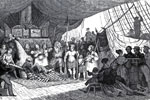
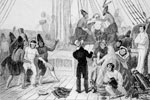
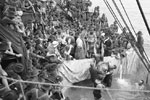
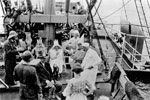
![Crossing the line on HMAS Melbourne around 1926. Australian National Maritime Museum ANMS0823[224]](images/CTL-HMAS-Melbourne-1926-ANMM-ANMS0823-224-web100.jpg)
![Crossing the line on HMAS Melbourne around 1926. Australian National Maritime Museum ANMS0823[226]](images/CTL-HMAS-Melbourne-1926-ANMM-ANMS0823-226-web100.jpg)
![Crossing the line on HMAS Melbourne around 1926. Australian National Maritime Museum ANMS0823[228]](images/CTL-HMAS-Melbourne-1926-ANMM-ANMS0823-228-web100.jpg)
